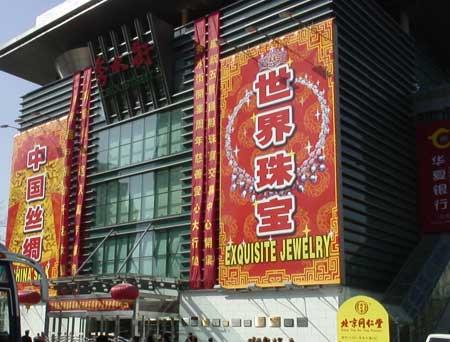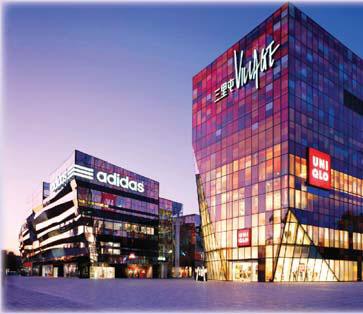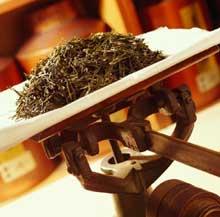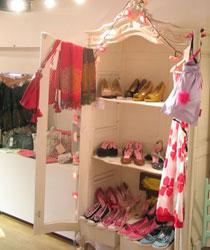A hutong shop
At first glance, the sofa may suggest a private living room, but Mu Gongchang's products are all made and sold in this converted hutong house.
Handcrafted greeting cards (RMB 10-20), photo albums (RMB 50-150) and handmade notebooks (RMB 5-200) can be found on display in the living room. If you don't see anything that grabs your fancy, talk to the owner about your specific needs. They will be more than happy to turn your ideas into practical objects.
Fans of vintage apparel should check out the leather jackets (RMB 200-600) and military jackets (RMB 180-300).
The Silk Street Market

The Silk Street Market in Beijing, which has long offered copies of international designer and branded goods, has unveiled its own brand-SILKSTREET-and warned that anyone who tries to counterfeit that brand will be held liable.
The first items to bear the SILKSTREET name, displayed on Wednesday, include apparel such as neckties, shirts and scarves, as well as a few household items such as tablecloths. They are marked "quality guaranteed" with a label that tells buyers that "the goods are certified by the Silk Street Market. If any quality problems are found, the market will bear the responsibility of compensation."
"SILKSTREET products are sold exclusively in the market. Anyone using the brand outside will be held liable," the Beijing Evening News quoted Wang Zili, general manager of the market, as saying.
Nearly 100 stalls connected with 39 market shops will be entitled to sell the goods initially. T-shirts, jeans, knitted goods, jewelry, luggage and other items will be added to the product line, Wang said.
Those now authorized to sell SILKSTREET products had to have a good business record, said Wang, with "no record of selling fake or shoddy products within six months and no [customer] complaints."
Most of the SILKMARKET items come from the factories of famous Chinese manufacturers. For instance, shirts come from the century-old silk company Ruifuxiang, according to the newspaper.
Market administrators believed that establishing the brand would be an important step to protect intellectual property rights, the report said.
The Silk Street (Xiushui) market in eastern Beijing's Chaoyang District has become popular with overseas tourists, who have flocked there to buy counterfeit and knock-off luxury clothes and accessories since 1985.
In March 2005, the outdoor market moved to a multi-story building next to Xiushui Street for better management.
Find of the Month: Feline Fetish
When visitors arrive in Beijing, the itinerary is clear: A visit to the Great Wall, the Forbidden City and roast duck at Quanjude are amongst the more common stops on the tourist circuit. However, when my guests arrived, I was more than a little surprised at their requests. "I don't care where you take us really," my aunt said. "As long as we can go to the Cat Shop."
The cat shop is a rather small, inconspicuous boutique on Gulou Dongdajie, sandwiched between a couple of grungy guitar stores. Most visitors tend to sweep past it as they search earnestly for the north entrance to Nanluogu Xiang, that well-known haven for Western backpackers searching for tasteful trinkets from "the real China." However, after ogling the feline-inspired fancies that I had brought back home for various friends and family, the cat shop seems to be the first place my guests want to go.
The store specializes in ornaments and accessories embellished with all things cat-like. The left-hand side of the petite boutique displays porcelain ornaments of cutesy, rotund cats, but the goods hanging on the opposite wall are even more charming.
Made from silk imported from Japan and Taiwan (but crafted in the Chinese mainland to keep prices low), the bags and purses are simply irresistible. Coin purses start from RMB 25, and pencil cases retail for RMB 30. Not only are they adorable, they're also very well made, making for purr-fect stocking fillers. These prices may appear affordable at first, but be warned: A shopping spree here can become pricey since one item is never enough. The good news though is that the more you spend, the more of a discount you'll receive.
Sanlitun Village

Sanlitun Village has opened its doors. The shopping center is designed not just for shopping, but also as a community, a place for art, culture and to spend leisure time.
Plenty of famous stores have opened here: Artini, Columbia, Lacoste, Levi's, Mizuno, Steve Madden, adidas' biggest flagship store, China's first direct-sales Apple store, Puma's biggest flagship store in Asia and Fossil. There are also quite a few children's wear and toys stores, where parents can find lovely toys and clothing for their kids.
An ice rink, chairs to rest, and art works to appreciate are just part of the design to make visitors feel comfortable. Underground there is MEGBOX film city, with eight rooms and 1,700 seats, the biggest in the area.
Currently, Hong Kong artist Dorophy Tang is exhibiting her latest series of Angel Baby sculptures, until Jan 17. Enter a "Hide and Seek Hunt" to search for hand-drawn Angel Baby sculptures to win one of your own and raise money for charity.
Plenty of restaurants and cafs have opened in the area, too, including Element Fresh, Peppes Pizza, and Starbucks Coffee. Otherwise, one might want to try Herbal cafe, or Royal Tea. There are also health and beauty stores in the area to refresh yourself after shopping.
Japanese designer Kengo Kuma has designed bold irregular geometrical shapes, and rich colors to endow personality on the 19 buildings in the shopping center. A lot of glass walls, plastic pipes, wood, stone and bamboo are also used.
The south part of the shopping area is more fashionable, colorful, and draws on inspiration from hutong. The north part's open courtyard style comes from Beijing's traditional courtyard house, and the architectural style is more metropolitan.
More stores are scheduled to open in the area, including Folli Follie, Swatch, and McDonald's and Hatsune. The shopping area is set to become another hot spot in Sanlitun.
Tea street

Maliandao tea street in Xuanwu District has everything a tea lover could dream of. With tea being one of the luxury products produced domestically, it is now going through a renaissance with the burgeoning Chinese upper class. Beijingers, who once snubbed southern Chinese teas, are quickly becoming connoisseurs and buying expensive, aged pu er brick teas and the highly valued, exclusive qingming green teas.
Seeing this booming market, top producers from all over the country send spokesmen to Maliandao to open teashops. So it s also the best place in Beijing to learn from regional experts about Chinese tea.
Maliandao can be daunting for first-timers, with its boisterous teashops selling thousands of different teas and its less-than-glamorous restrooms. But it makes for a perfect day trip for those looking for some culture and adventure. Here are a few of our favorite tea stops.
Hong Zhi Teashop
Owner Hong Zhi from Anhui province has set up one of most reputable and relaxing shops on Maliandao. His selection of Anhui teas is unbeatable and the employees here are knowledgeable on teas from all over China; a rarity as most people in the tea industry believe only tea from their home province is worth mentioning. Try their Monkey King green tea from Taiping Lake (Taiping houkui), or keemun black teas (qimen hongcha) all made in Hong Zhi s home province, some even made on his brother s farm.
Location: 10 Maliandao Chaye Jie, Xuanwu District
Opening hours: Daily 8am-10pm
Tel: 010-6342-4406
Shi Jie Cha Teashop
Owner Lou Ping is from Wuyi Mountain, China s most famous oolong region. Her unassuming shop at the end of Maliandao brings the best of the Wuyi Mountain rock oolongs highly oxidized, full of minerals, and complex to Beijing. Try the dahongpao. And since this shop is open 24 hours, there s a selection of pu er bricks for late night tea drinking.
Location: E-29 Cha Yuan, Maliandao Chaye Jie, Xuanwu District
Opening hours: Daily 12am-12pm
Tel: 010-5180-9681
Si Ji Cha Xiang Tea Ware Shop
This tea ware shop, owned by Jin Huashun, primarily exports to Korea so quality here is higher than most, with unique tea wares made from natural materials. Their imaginative gourd tea filters and bamboo scoops are favorites with tea lovers.
Location: 2/F, 11 Maliandao Chaye Jie, Xuanwu District
Opening hours: Daily 8.30am-6pm
Tel: 010-6334-3060
Geng Xiang Shi Fu Restaurant
Tea drinking should never be attempted on an empty stomach. That s why this delicious Zhejiang restaurant makes the perfect pit stop. The owner, a pioneer in China s organic tea movement, never uses MSG and sometimes uses organic vegetables. Guests can enjoy live shows starting at 6pm, such as traditional Chinese music or dancing tea ceremonies.
Location: 2/F, Gengxiang Teahouse, Maliandao Chaye Jie, Xuanwu District
Opening hours: Daily 9am-10pm
Tel: 010-6342-5443
Flower markets in Beijing

Chaoyang Park is a relatively new addition to Beijing's municipal parks and it now includes the largest green space in the city. Neatly positioned between the Third and Fourth Ring roads, the park is a centre of entertainment and was most recently a focus for some great restaurants, bars and nightclubs, particularly at the West Gate.
Although the large lake that meanders across the space is frozen in winter, in summer pleasure boating dominates the parks many other activities. There is also a full-scale entertainment centre accessible from the park's South Gate.
The West Gate, well known to local foreign residents, is the entrance closest to the Goose and Duck Pub, an expatriate watering hole. Access to the Park's lakes is but a few minutes stroll. The West Gate is also near to some great restaurants including Annie's, a newly expanded Italian bistro, The World of Suzie Wong, the excellent late-night 1930s Shanghaiesque lounge bar and another Jenny Lou's supermarket outlet, popular to almost everyone who loves cheese, butter and olive oil, sometimes precious commodities in the capital.
Near the South Gate of Chaoyang Park, you will find The Big Easy, a jazz joint selling hamburgers and beer. Across the road you will find Latinos, a late night Latin dance bar that swings!
Around Chaoyang Park, new gilt-edge housing accommodates Beijing's most successful people. Palm Springs, Park Avenue and Fairview Gardens are but a few of the new digs available in the area.
Continue along up Chaoyang Park West Road and you will reach Ladies Street, also known as the Laitai Flower Market. New to the city, it's great for recreation, short visits or decorating a home. The flowers and other items available at Laitai will grab the more creative of you right off the street and part you from the money with ease! It is a brilliant place for turning a humble home into a tropical paradise. Abundant plants and flowers, pots and shrubs, vines and miniatures trees and puppies, fish and clothes make sure you cannot leave empty handed!
Remember, go to Laitai Flower Market with things to buy in mind otherwise the choice can be boggling and, as always, remember to bargain. The by-word of Beijing shopping is haggle! haggle! haggle!
Wonderful wardrobe

Generally you have to rummage patiently through little Chinese boutiques to find anything vaguely wearable, but this store is different virtually everything on offer here is a gem.
The store is small; more than two customers at a time are likely to render the space very crowded indeed. Yet despite the restrictions, they still manage to cram in a heck of a lot of superb clothing and accessories. The main draw is the rack of posh frocks towards the rear of the boutique (starting from RMB 400), which are exquisite.
For accessories fiends, the tasteful hats (from RMB 100), scarves and jewelry are positioned artfully on the raised staircase.
Bo Yi Chu
Location: 146 Dongsi Beidajie, Dongcheng District
Opening hours: Daily 11am-9pm
